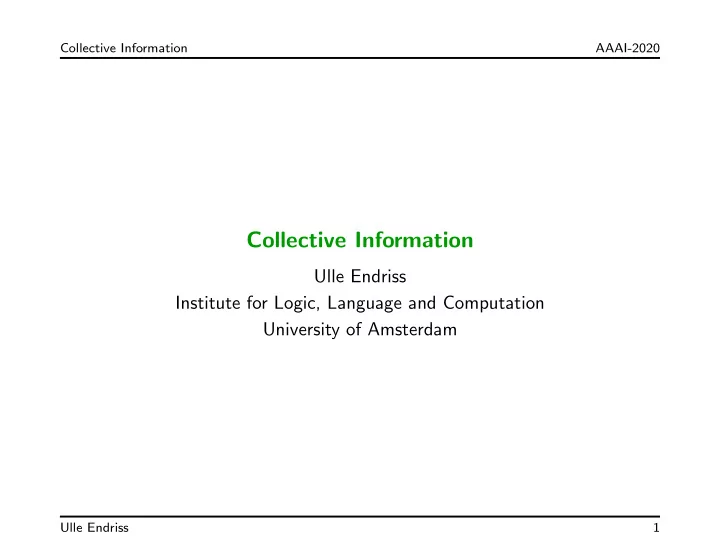

Collective Information AAAI-2020 Collective Information Ulle Endriss Institute for Logic, Language and Computation University of Amsterdam Ulle Endriss 1
Collective Information AAAI-2020 One-Slide Version of the Talk “ aggregation is everywhere ” (not just in computational social choice) should focus on general principles, not just specific domains (transfer of knowledge will benefit all application domains) difficult, but not too difficult (people are doing this already, to some extent) Ulle Endriss 2
Collective Information AAAI-2020 Aggregation is Everywhere Lots of challenging applications involve some form of aggregation: • voting • reputation systems • collective argumentation • consensus clustering • ontology merging • . . . Ulle Endriss 3
Collective Information AAAI-2020 Common Pattern All of these application scenarios share the same general pattern: pieces of information encoded in domain-specific language provided by several agents F : L n → L “ collective information ” Also: input constraints — output constraints — input distribution Ulle Endriss 4
Collective Information AAAI-2020 Looking for General Principles How do domain parameters (language, constraints, distribution, . . . ) affect our ability to design “good” aggregation rules? • “good” in normative terms: try to be fair • “good” in epistemic terms: try to be accurate • “good” in algorithmic terms: try to be efficient Ulle Endriss 5
Collective Information AAAI-2020 Examples for Successful Knowledge Transfer Understanding general principles should enable transfer of knowledge between application domains. Somewhat happening already: • Normative: we got impossibility results for collective argumentation by exploiting similarities to preference aggregation • Epistemic: Caragiannis et al. (2016) designed peer grading methods inspired by work on truth-tracking abilities of common voting rules • Algorithmic: de Haan (2018) obtained efficient methods for participatory budgeting via encoding in judgment aggregation W. Chen and U. Endriss. Preservation of Semantic Properties in Collective Argu- mentation. Artificial Intelligence , 2019. I. Caragiannis, G. Krimpas, and A. Voudouris. How Effective Can Simple Ordinal Peer Grading Be? EC-2016. R. de Haan. Hunting for Tractable Languages for Judgment Aggregation. KR-2018. Ulle Endriss 6
Collective Information AAAI-2020 Another Example: Graph Aggregation Our work on graph aggregation demonstrates the benefits of studying aggregation in the abstract, yielding insights for many applications: • voting under bounded rationality (graphs as preference relations) • collective argumentation (graphs as abstract argum. frameworks) • belief merging (graphs as plausibility orderings) • consensus clustering (graphs as equivalence relations) • . . . But: so far only normative perspective U. Endriss and U. Grandi. Graph Aggregation. Artificial Intelligence , 2017. Ulle Endriss 7
Collective Information AAAI-2020 Take-Home Message Need to aggregate individual pieces of information into a single piece of collective information is everywhere. Progress requires not just more domain-specific work but crucially also domain-independent work on general principles of aggregation. Computational social choice provides the right toolbox for doing so. Ulle Endriss 8
Recommend
More recommend